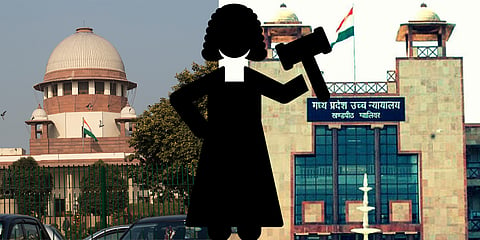

[dropcap]I[/dropcap]N a one of its kind case, the Supreme Court is currently hearing a petition seeking reinstatement of an Additional District Judge who resigned after alleging sexual harassment charges against a Judge of the Madhya Pradesh High Court in 2014. In a legal battle spanning these five years, she has been fighting for her rights, by writing to the Chief Justice of India, and the President, filing a writ petition in the Supreme Court, and even sought an inquiry into the misconduct of the High Court judge in 2015.
This plea was her right under the transfer policy that permitted such delay if the judge had a "daughter" in the final year of school or university and the educational institution did not have a hostel facility. She exercised her right and made a representation to the Transfer Committee; it was rejected.
However, the illegality in the transfer did not end there. She was ordered to be transferred from Gwalior, a Category "A" city to Sidhi, a Category "C" city. She made another request to transfer her to a Category "B" city instead, that too in lieu of a procedure prescribed under the policy, that transfers will be made from Category A to B, to C, to D to A. That too was rejected.
The lady ADJ after resigning in 2014, sought an investigation in the misconduct of the High Court judge, pursuant to which a Judges Inquiry Committee was set up by the Rajya Sabha in 2017 on the charges of sexual harassment, and validity of the her transfer.
This JIC consisted of one sitting Supreme Court judge, Justice R. Bhanumathi, a Bombay High Court judge at that point, Justice Manjula Chellur, and Mr. K.K. Venugopal, the present Attorney General of the country headed the Committee.
In an intense investigation that consisted of depositions, direct examinations and cross examinations of the witnesses, the JIC report, published in December 2017 details out its findings in all the three charges. It held that the charge of sexual harassment "could not be established beyond reasonable doubt."
With the backing of this recommendation, the ADJ wrote to the Madhya Pradesh High Court to seek her reinstatement. However, to her misfortune, the order she received from the Full Court of MP stated that she had "voluntarily resigned" four years ago, and hence could not be re-instated. The Full Court rejected her request.
It is in this background that she continued her fight, and approached the Supreme Court challenging the order of the Madhya Pradesh High Court rejecting her reinstatement.
Before the Supreme Court bench of Justices Sikri, Abdul Nazeer, and M R Shah, Senior Advocate Indira Jaising, appearing for the lady ADJ, contended that there is a material and significant difference between "voluntary resignation" and "forced resignation".
She emphasised on the multiple attempts made by the lady ADJ before she resigned in the form of her representations, and efforts to meet with the Chief Justice of the Madhya Pradesh HC in hope of a solution that doesn't compromise her daughter's education.
When a judicial officer with a good performance record, and having handed additional special courts and responsibilities was forced to resign due to lack of due process, the "resignation" even though written and handed on her own, was forced.
She also argued that the State was to be a model employer and that the State had violated her right to non-discrimination based on sex and her right to work in an environment free from sexual harassment .
With the conclusion of her arguments, Ravindra Shrivastava appearing for the Madhya Pradesh High Court, commenced his arguments; however, the Bench abruptly stopped him and asked if the High Court would be willing to reconsider their decision denying her re-instatement on humanitarian grounds.
The Bench emphasised that the issue was about a good judicial officer who seeks to join service again. Justice Sikri, in the first of its kind order, the bench passed an order requesting the High Court to hold a full court meeting and come back within a week, with a decision on her reinstatement with seniority.
They pointed out that video conferencing facilities were available in the High Court and there should be no logistical problem in taking a decision as soon as possible.
The next date for the matter is on the February 21, 2019,